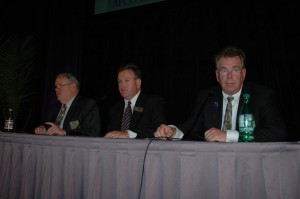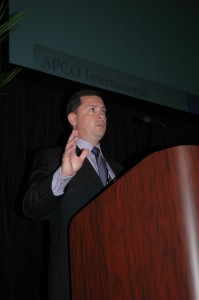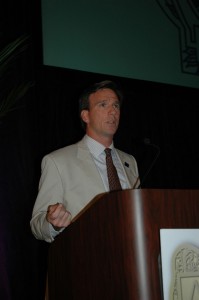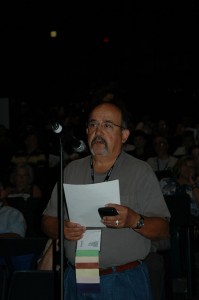From the APCO First General Business Meeting

APCO President Richard Mirgon, President-Elect Bill Carrow and 1st Vice-President Gregg Riddle (Photos Courtney McCain)
On Aug. 1, at 1 p.m., APCO President Richard Mirgon called the association’s First General Business Meeting to order. “We know you have come from all over the country and world, and appreciate your attendance during these tough economic times,” he began. “Public safety communications professionals recognize that Houston is the place to be this week to enhance what we do.”
After introducing the APCO Executive Committee and the Board of Directors, he said, “The SGI has brought more diverse ideas to the Board, and it has been a pleasure to serve alongside these dedicated members of the Board.”
The first order of business, presided over by President-Elect Bill Carrow, was to vote on bestowing Life Membership on John Johnson of the Tennessee Chapter, Mathew Stillwell of the Oklahoma Chapter and APCO President Dick Mirgon. Past President John Powell made a motion to affirm the Life Membership, which Past President Nate McClure seconded. With no discussion, the Quorum voted unanimously to grant Life Member status to the three nominees, who then reentered the room to a standing ovation.
BAPCO President Kevin Robson took the stage to honor Mirgon with a token of friendship, the British “Bobby” hat. Robson said, “Historically it has become a tradition for members of British APCO to recognize the friendship and support and appreciation between the UK and America. To mark Dick’s contributions over the past [year], I would like to make this presentation on behalf of BAPCO. Sorry, but you have to wear it [presenting the hat]. The hat qualifies [Mirgon] as a special constable in the UK, and he can graze his sheep in the county of Hampshire any time he comes.”

Chris Essid of the Office of Emergency Communications said, "We must begin developing public safety standards for LTE networks today. ... These efforts must be taken care of now, regardless of how the D Block is solved."
The Quorum then heard presentations from Chris Essid of the Office of Emergency Communications, APCO Regulatory Counsel Robert Gurss and APCO lobbyist Sean Kirkendall. Among other things, they addressed regulatory and legislative activities, including the National Emergency Communications Plan, the D Block, narrowbanding, and cell phone jamming in prisons.
Regarding the D Block, they urged attendees to contact their members of Congress and encourage them to support the D Block reallocation to public safety. “You have a lot to say,” Kirkendall said; “trust me. And we need you to [say it]. We need to keep the pressure up.”
Gurss reminded attendees of the Jan. 1, 2013, deadline for narrowbanding to 12.5 kHz or equivalent efficiency for radios operating in bands below 512 MHz. “I think the FCC will hold firm to that deadline,” said Gurss.
The next agenda item was a special presentation to Mirgon from the APCO Historical Committee. Committee Chair Richard Rybicki and Phyllis Fuller of the Michigan Chapter presented an enhanced and framed, black-and-white photo of the first APCO National Conference in 1935. One copy will hang in the APCO national headquarters in Orlando, and the second will hang in the APCO Washington, D.C., office. A special thanks was given to the APCO Michigan Chapter for funding the gift.
 Sean Kirkendall updated the Quorum on APCO’s work on key legislation, such as cell phone jamming in prisons and the reallocation of the D Block to public safety.
Sean Kirkendall updated the Quorum on APCO’s work on key legislation, such as cell phone jamming in prisons and the reallocation of the D Block to public safety.
The final order of business was the first reading of the two resolutions that will be put forth for a vote during the Second General Business Meeting on Tuesday, Aug. 3.
Resolution 1 would rename several membership categories. Active Member would become Full Member; Member would become Associate Member; and Governmental Group would become Agency Group. There are no changes to the Commercial, Corporate Group or International Associate member categories.
The resolution would also create a new Online Member category. Online Members would not receive any mail from the association, but would be able to print a copy of their membership card from the Web, have access to the magazine online, receive the eNews and belong to PSConnect. They would have no right to vote or hold elected office, but could serve on committees and task forces. They would not be eligible for Senior or Life Member status, but their years as an Online Member would count toward the length of the membership requirement if they were to later upgrade their membership status. They would not receive discounts on APCO products or services.
The Agency Group memberships would be split into four levels on the basis of agency staff size: up to 10 staff (three Full membership plus Online), 11 to 25 staff (eight Full plus Online), 26 to 50 staff (15 Full plus Online) and 51 staff and above (22 Full plus Online).
No discussion or amendments were presented after the reading.
Resolution 2 would define in more detail the APCO Senior and Life Membership qualifications. The goal is to bring an even higher level of candidate forward and encourage the future leaders of the association to strive toward meeting the requirements of the Senior and Life Member designations.
During the Business Meeting, an amendment to Resolution 2 was presented that would retain the current language of section 1.3.2.8 of the Policy Manual. Under the resolution, consideration of a nominee’s work as chair of a regional conference standing committee as delineated by the Regional Conference Manual would no longer be considered as a criterion for Life Member status. The proposed amendment would restore this criterion as a qualifying factor.
Three members spoke in support of amending Resolution 2, emphasizing the importance of the hard work conducted by subcommittee chairs in planning regional conferences. “If subcommittees fail in their duties,” said CPRA Member Charles Taylor, “the [conference] fails.”
CPRA’s John Wright said, “Those individuals who hold those positions do a lot more on the regional level than national level, [and] they need to be recognized. They are doing this on their own time as volunteers. We should be recognizing this work.”
Before calling recess, Mirgon reminded everyone to attend Monday’s Opening Keynote Presentation at 8:30 a.m. to hear keynote speaker Jim Lovell. He also urged attendees to attend Monday afternoon’s FCC Regulatory Panel and Town Hall, beginning at 3:15 p.m.
The Second General Business Meeting will be held on Tuesday afternoon at 4 p.m.
About the Author
Natasha Yetman is the associate editor of APCO’s Public Safety Communications. Contact her via e-mail at yetmann@apcointl.org.


